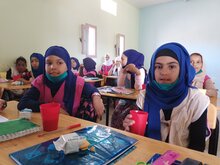WFP Executive Director Visits Algeria, Including Camp for Western Sahara Refugees
A highlight of his visit to Smara camp was the WFP-supported hydroponics project, which is increasing the production of goat meat and milk for the benefit of the refugees. Hydroponics is a soilless cultivation technique for the growing of plants in infertile areas. It produces results quickly and uses 80 percent less water than traditional agricultural methods.
Working with a refugee engineer and other refugee specialists, WFP has developed low-tech hydroponic units that can be built with local materials and are easy to maintain, allowing families to grow fresh animal fodder in just seven days. Preliminary results point to an increase of goat milk and meat production and a decrease in young livestock mortality.
“These hydroponic units are examples of how an innovative approach delivers real results for the people WFP serves,” Beasley said. “They are simple, cost-effective and they match with these refugee identities as nomads who value their livestock. This innovation will not only help people in these refugee camps, it can support food-insecure families living in harsh conditions anywhere.’’
There are currently 50 hydroponic units in the refugee camps in Algeria that can produce up to 2,000 kg of fresh fodder every day. Some 500 refugees, most of them women, are directly benefitting from the project. WFP plans to increase the number of units in the camps by fourfold in coming months.
WFP’s Munich-based Innovation Accelerator provides key support for the hydroponics project. The Accelerator helps fund innovations and start-ups, linking teams with experts from non-profit and private sectors as well as academia to develop high-impact solutions for a hunger-free world.
During his visit to Algeria, Beasley met the Algerian Prime Minister, the Minister of Agriculture, and the Secretary General of the Ministry of Foreign Affairs to discuss cooperation priorities, and thanked the Algerian government and the people for their continued support of the country’s vulnerable refugee population.
For more than 40 years, refugees from Western Sahara have been living in harsh conditions in five camps in the desert of southwestern Algeria. During this time, the refugees have depended on external assistance, with WFP being their primary source of food since 1986.
# # #
WFP is the world's largest humanitarian agency fighting hunger worldwide, delivering food assistance in emergencies and working with communities to improve nutrition and build resilience. Each year, WFP assists some 80 million people in around 80 countries.
Follow us on Twitter @wfp_media and @wfp_MENA
For more information please contact (email address: firstname.lastname@wfp.org):
Katharina Meyer-Seipp, WFP/Algiers, Tel. +213 21 60 80 66, Mob. +213 660811416
Abeer Etefa, WFP/Cairo, Tel. +2010 66634352
Jane Howard, WFP/Rome, Tel. +39 06 65132321, Mob. +39 346 7600521
Francis Mwanza, WFP/London, Tel. +44 20 72409001, Mob. +44 7968 008474
Bettina Luescher, WFP/Geneva, Tel. +41 22 917 8564, Mob. + 41-79-842-8057
Steve Taravella, WFP/New York, Tel. +1-646-5566909, Mob. +1-202-770-5993
Challiss McDonough WFP/Washington, Tel. +1-202-653-1149, Mob. +1-202-774-4026

